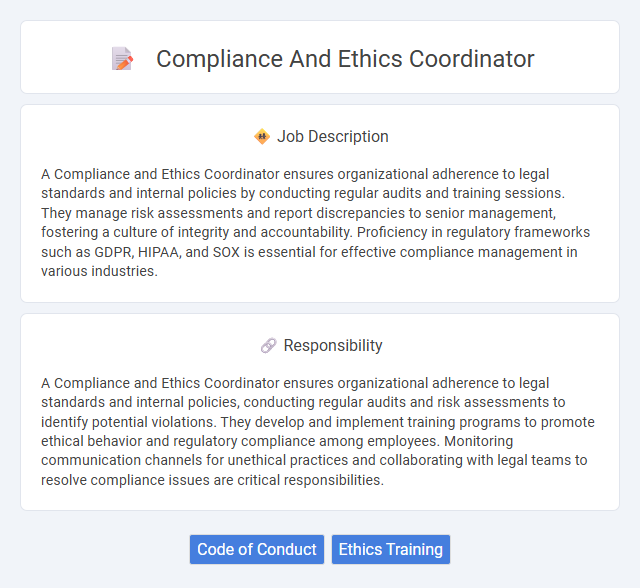
A Compliance and Ethics Coordinator ensures organizational adherence to legal standards and internal policies by conducting regular audits and training sessions. They manage risk assessments and report discrepancies to senior management, fostering a culture of integrity and accountability. Proficiency in regulatory frameworks such as GDPR, HIPAA, and SOX is essential for effective compliance management in various industries.
Individuals with strong attention to detail, integrity, and a keen sense of fairness are likely to be well-suited for a Compliance and Ethics Coordinator role. Those who exhibit good communication skills and the ability to navigate complex regulations may find the job aligns with their strengths. Conversely, people who struggle with ethical decision-making or remain uncomfortable enforcing rules could encounter challenges in this position.
Qualification
A Compliance and Ethics Coordinator typically requires a bachelor's degree in law, business administration, or a related field, coupled with strong knowledge of regulatory frameworks and corporate governance standards. Proven experience in risk assessment, compliance audits, and ethical policy enforcement is essential to ensure organizational adherence to legal and ethical guidelines. Effective communication skills and attention to detail enable successful coordination across departments to promote a culture of integrity and compliance.
Responsibility
A Compliance and Ethics Coordinator ensures organizational adherence to legal standards and internal policies, conducting regular audits and risk assessments to identify potential violations. They develop and implement training programs to promote ethical behavior and regulatory compliance among employees. Monitoring communication channels for unethical practices and collaborating with legal teams to resolve compliance issues are critical responsibilities.
Benefit
The Compliance and Ethics Coordinator role likely offers significant benefits such as enhancing organizational integrity by ensuring adherence to legal and ethical standards. It probably provides opportunities for professional growth through continuous learning about regulatory requirements and risk management strategies. Engaging in this position may also improve critical decision-making skills and foster a culture of accountability within the company.
Challenge
The role of a Compliance and Ethics Coordinator likely presents challenges in navigating complex regulatory environments while ensuring organizational adherence to evolving legal standards. Balancing the enforcement of ethical practices with fostering a positive workplace culture may pose ongoing difficulties. Managing diverse stakeholder expectations while maintaining transparency and integrity could also test communication and problem-solving skills.
Career Advancement
Compliance and Ethics Coordinators play a crucial role in ensuring organizational adherence to legal standards and ethical guidelines, positioning themselves for career advancement into senior compliance officer or risk management roles. Mastery of regulatory frameworks, audit processes, and effective communication skills enhances opportunities for leadership positions within corporate governance. Continuous professional development through certifications such as Certified Compliance & Ethics Professional (CCEP) boosts competitive advantage and career progression in the compliance field.
Key Terms
Code of Conduct
A Compliance and Ethics Coordinator ensures organizational adherence to the Code of Conduct by implementing monitoring systems and facilitating employee training programs. This role involves conducting regular audits and investigations to detect violations and recommending corrective actions that uphold ethical standards. Maintaining up-to-date knowledge of regulatory requirements and industry best practices is essential for supporting a culture of integrity and transparency.
Ethics Training
Compliance and Ethics Coordinators design and implement comprehensive ethics training programs to ensure employees understand regulatory requirements and organizational values. These training initiatives promote a culture of integrity, helping to prevent misconduct and enhance ethical decision-making across all departments. Regular assessments and updates to the training materials maintain alignment with evolving legal standards and industry best practices.
 kuljobs.com
kuljobs.com